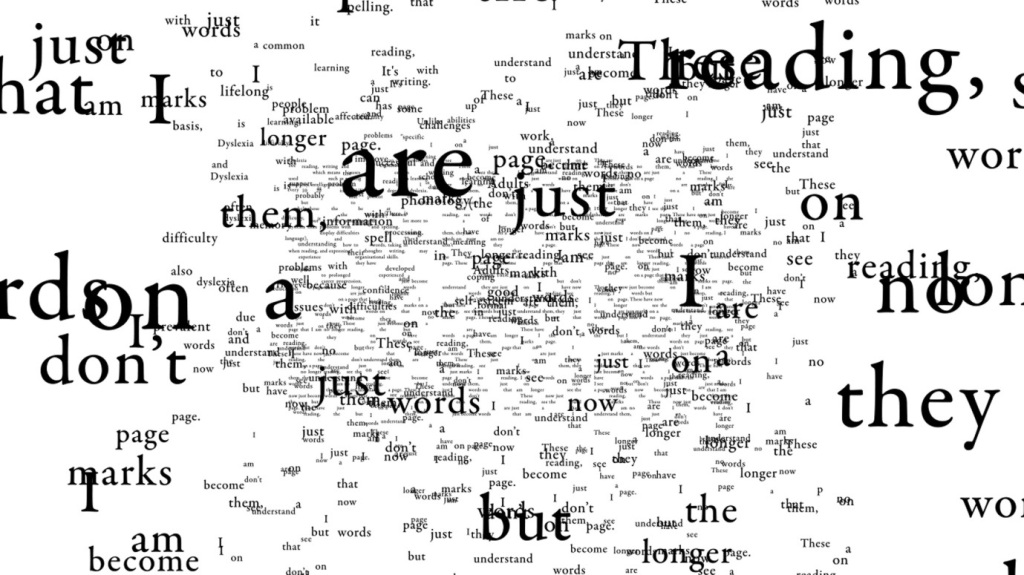In October last year I was given the chance to partake in the multiagency self evaluation file reading. This is where professionals from different multiagency sectors (e.g. health, social care, police) who have experience of working with those under Adult Support and Protection legislation, review how the multiagency acted when a vulnerable person was identified as potentially requiring some more support following referral. It was a great opportunity to step away from the concerns in real time, reflect on how our teams worked individually and together, and reflect on how we could improve outcomes for people who are often at their most vulnerable. We reviewed 50 referrals at this time and gained a lot of valuable insight into good practice, and areas for improvement.
One file I read really struck me as an important one to explore and learn from. An adult who was struggling a lot with his mental health, advised during an inpatient assessment that he had always struggled with his reading and writing, and left school early with no qualifications because of this. He had recently ended his relationship with his partner, and had been supporting him with general tasks like dealing with letters at home. Previously he had been offered support via a mental health support app,vbut said that he struggled accessing it due to communication barriers with reading and understanding how to access the app from written instructions. This information was not passed on to the multiagency teams that he was referred to and he was sent all communication about support and appointments by letter. He did not opt in or engage and sadly was discharged from the service; and he was also informed about this via letter. Had the information of his reading and writing details been communicated between staff dealing with his care he may have been enabled to access the help and support that he needed.
It is important to consider all communication needs and think of how you often receive information yourself. If you think of an appointment letter you received, if this other person received it would they be able to understand the information given to them and act on this as they wished? Would they feel involved and empowered through this to make an informed decision about the care they are receiving?

It reminded me of when I was beginning in my nursing career, and there was a patient who was very quiet, he did not read or do crossword puzzles like many did to pass the time. He did not have visitors and just sat quietly all day, every day, between the ward rounds and procedures. He would be given his menu daily to complete but would hand it back empty saying he was not hungry, or that he couldn’t face food that day. It was only when talking to him about how good the hospital macaroni and cheese was that he said he liked the sound of that. I told him I’d go back and mark this on his menu, I asked if there was anything else he wanted added in as it had been a couple of days since he had something, from memory he could have ice-cream and jelly for pudding, he asked for this happily and ate everything on his tray. The next day he was without breakfast as his previous form was empty for breakfast, I said we had some cereal spare if he wanted some and again he happily had this all. As you’ve probably already guessed, this gentleman also had reading difficulties that he did not want to share, I never asked him about them but just sat and read his menu to him as he happily said his choices, and when I was coming to the end of my shift I added to the handover sheet that he may require support filling in forms. This simple handover of information about communication meant he could now fill in his menu, and get his nutrition when in hospital. He could now be read his medical documents, and give informed consent of forms for procedures. When he was being discharged, it was handed over to Social Work that he was for communication through visits or phone, and district nurses were also aware and would read directions or instructions to support him take his medication.
What is literacy?
Literacy is the ability to read, write, speak and listen in a way that lets us communicate effectively and make sense of the world.

The most recent statistics for adult literacy levels in Scotland (2009) show that In Scotland 1 in 4 (26.7%) of adults experience challenges due to their lack of literacy skills, this is the highest in the UK, within this, 1 in 28 (3.6%) face serious challenges in their literacy practices. (National Literacy Trust). https://literacytrust.org.uk/parents-and-families/adult-literacy/#:~:text=poor%20literacy%20skills.-,Scotland,their%20lack%20of%20literacy%20skills.
Such literacy difficulties can lead to ongoing challenges with navigating everyday life; accessing employment, finances, housing, support, and many more important things we can take for granted when we do not face this same struggle.
Whilst it seems a little bit of information to share, it is so important and can make the world of difference in someone’s care and journey.
Please think:
Are there any communication barriers for this patient?
Would they understand this better if I read it out loud to them or showed pictures?
If they do have a communication barrier, how will this impact them in the care they receive from other agencies and what can I do to help?
How can I effectively hand this over to other teams involved in their care?
If submitting an AP1 form, consider ticking communication barrier and providing more information.
Helen Bogle, Public Protection Advisor, Dumfries and Galloway NHS
Contact Us
The Public Protection Team can offer supervision, advice and support to anyone who wishes to discuss concerns about any person at risk of harm.
Phone: 01387 244300
Email: dg.asp@nhs.scot or dg.childprotectionteam@nhs.scot
For information on Dumfries and Galloway Public Protection Week 2024 events please see https://www.dgppp.org.uk/article/24123/Dumfries-and-Galloway-Public-Protection-Week-2024-Programme

Thanks for sharing Helen. A powerful reminder of the value and importance of truly person centred care.
Our team (Patient Services) can assist with helping to make patient and carer information more accessible, including arranging interpretation and translation as needed. The team can be contacted by email at dg.patientservices@nhs.scot or by telephone on 01387 272733 (or via ContactScotlandBSL for British Sign Language Users).
Thanks so much for your comment Emma, that’s great to have this information linked to the blog for people to know where to turn to for further support for patients. I hope you don’t mind if I put this information in our next newsletter on a section I’m hoping to have about communication with vulnerable patients? thanks again, Helen
Absolutely Helen. The team are always happy to help with anything patient experience related, so feel free to signpost whenever you feel appropriate. Thanks
Well done Helen really interesting and thought provoking.
How proud will your little person be, a you tuber and blogger in one week.
Thank you Deborah, ah very proud and full of ideas on how to get more subscribers and likes 🙂
Great blog Helen, lovely to read your insights and learning and you highlight such an important topic of literacy and how we in Health and Social care can identify, act and support in this space. Thanks Mark
Thank you Mark, I really appreciate you taking the time to read this and comment, i hope it will bring a little awareness to the different types of communication barriers our patients may be impacted by, thanks, Helen
So heart felt and identifiable for so many of us..in our personal and professional lives . Great insight. Thanks so much
Thank you Kim, its been a really interesting conversation to have with a few people now, so I’m glad so much came from that one file and seeing a little part of someone’s story, thanks, Helen
brilliant blog Helen thank you. Really important to think about how we communicate and how we pitch this at all times. The importance of a handover of information too which can make the difference between future engagement with services or not. Thank you
Thanks so much Karen, the file reading was such an interesting experience and there was so much to learn from effective handovers both within the same service and between different services, can make such a difference in how someone will engage and how we can support them in this, thank you for taking the time to read the post and comment, Helen
Thank you Helen for delving into the crucial issue of communication challenges in healthcare and social services, especially when language becomes a barrier. The real-life difficulties faced by individuals who can’t read or speak the language, it is worth a thought to explore effective strategies for improving communication and fostering inclusivity.
Thank you Elise, yes absolutely, there must be so many ways we can support and would be so good to even seek support from those struggle with written communication to see how we can best meet their needs. It could mean the difference of someone having the appropriate ongoing support in place or just accessing services when in crisis. Thank you so much for commenting, Helen
Great blog Helen and a big reminder to all of how much the “little things” really matter.